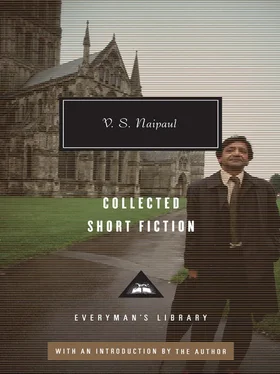Hat would say, ‘We better send for the fire brigade.’
And for the next two or three hours Morgan would prowl in a stupid sort of way around his back yard, letting off fireworks so crazily that we used to hear his wife shouting, ‘Morgan, stop playing the ass. You make ten children and you have a wife, and you can’t afford to go and dead now.’
Morgan would roar like a bull and beat on the galvanized-iron fence.
He would shout, ‘Everybody want to beat me. Everybody.’
Hat said, ‘You know we hearing the real Morgan now.’
These fits of craziness made Morgan a real terror. When the fits were on him, he had the idea that Bhakcu, the mechanical genius who was my uncle, was always ready to beat him, and at about eleven o’clock in the evenings the idea just seemed to explode in his head.
He would beat on the fence and shout, ‘Bhakcu, you fat-belly good-for-nothing son-of-a-bitch, come out and fight like a man.’
Bhakcu would keep on reading the Ramayana in his doleful singing voice, lying flat on his belly on his bed.
Bhakcu was a big man, and Morgan was a very small man, with the smallest hands and the thinnest wrists in Miguel Street.
Mrs Bhakcu would say, ‘Morgan, why you don’t shut up and go to sleep?’
Mrs Morgan would reply, ‘Hey, you thin-foot woman! You better leave my husband alone, you hear. Why you don’t look after your own?’
Mrs Bhakcu would say, ‘You better mind your mouth. Otherwise I come up and turn your face with one slap, you hear.’
Mrs Bhakcu was four feet high, three feet wide, and three feet deep. Mrs Morgan was a little over six foot tall and built like a weight-lifter.
Mrs Morgan said, ‘Why you don’t get your big-belly husband to go and fix some more motor-car, and stop reading that damn stupid sing-song he always sing-songing?’
By this time Morgan would be on the pavement with us, laughing in a funny sort of way, saying, ‘Hear them women and them!’ He would drink some rum from a hip-flask and say, ‘Just watch and see. You know the calypso?
“The more they try to do me bad
Is the better I live in Trinidad”
time so next year, I go have the King of England and the King of America paying me millions to make fireworks for them. The most beautiful fireworks anybody ever see.’
And Hat or somebody else would ask, ‘You go make the fireworks for them?’
Morgan would say, ‘Make what ? Make nothing. By this time so next year, I go have the King of England the King of America paying me millions to make fireworks for them. The most beautiful fireworks anybody ever see.’
And, in the meantime, in the back of the yard, Mrs Bhakcu was saying, ‘ He have big belly. But what yours have? I don’t know what yours going to sit on next year this time, you hear.’
And next morning Morgan was as straight and sober as ever, talking about his experiments.
This Morgan was more like a bird than a man. It was not only that he was as thin as a match-stick. He had a long neck that could swivel like a bird’s. His eyes were bright and restless. And when he spoke it was in a pecking sort of way, as though he was not throwing out words, but picking up corn. He walked with a quick, tripping step, looking back over his shoulder at somebody following who wasn’t there.
Hat said, ‘You know how he get so? Is his wife, you know. He fraid she too bad. Spanish woman, you know. Full of blood and fire.’
Boyee said, ‘You suppose that is why he want to make fireworks so?’
Hat said, ‘People funny like hell. You never know with them.’
But Morgan used to make a joke of even his appearance, flinging out his arms and feet when he knew people were looking at him.
Morgan also made fun of his wife and his ten children. ‘Is a miracle to me,’ he said, ‘that a man like me have ten children. I don’t know how I manage it.’
Edward said, ‘How you sure is your children?’
Morgan laughed and said, ‘I have my doubts.’
* * *
Hat didn’t like Morgan. He said, ‘Is hard to say. But it have something about him I can’t really take. I always feel he overdoing everything. I always feel the man lying about everything. I feel that he even lying to hisself.’
I don’t think any of us understood what Hat meant. Morgan was becoming a little too troublesome, and it was hard for all of us to begin smiling as soon as we saw him, which was what he wanted.
Still his firework experiments continued; and every now and then we heard an explosion from Morgan’s house, and we saw the puffs of coloured smoke. This was one of the standing amusements of the street.
But as time went by and Morgan found that no one was willing to buy his fireworks, he began to make fun even of his fireworks. He was not content with the laughter of the street when there was an explosion in his house.
Hat said, ‘When a man start laughing at something he fight for all the time, you don’t know whether to laugh or cry.’ And Hat decided that Morgan was just a fool.
I suppose it was because of Hat that we decided not to laugh at Morgan any more.
Hat said, ‘It go make him stop playing the fool.’
But it didn’t.
Morgan grew wilder than ever, and began challenging Bhakcu to fight about two or three times a week. He began beating his children more than ever.
And he made one last attempt to make us laugh.
I heard about it from Chris, Morgan’s fourth son. We were in the café at the corner of Miguel Street.
Chris said, ‘Is a crime to talk to you now, you know.’
I said, ‘Don’t tell me. Is the old man again?’
Chris nodded and he showed me a sheet of paper, headed CRIME AND PUNISHMENT.
Chris said with pride, ‘Look at it.’
It was a long list, with entries like this:
For fighting
(i) at home
Five strokes
(ii) in the street
Seven strokes
(iii) at school
Eight strokes
Chris looked at me and said in a very worried way, ‘It funny like hell, eh? This sort of thing make blows a joke.’
I said yes, and asked, ‘But you say is a crime to talk to me. Where it is?’
Chris showed me:
For talking to street rabs Four strokes For playing with street rabs Eight strokes
I said, ‘But your father don’t mind talking to us. What wrong if you talk to us?’
Chris said, ‘But this ain’t nothing at all. You must come on Sunday and see what happen.’
I could see that Chris was pleased as anything.
About six of us went that Sunday. Morgan was there to meet us and he took us into his drawing room. Then he disappeared. There were many chairs and benches, as though there was going to be a concert. Morgan’s eldest son was standing at a little table in the corner.
Suddenly this boy said, ‘Stand!’
We all stood up, and Morgan appeared, smiling all round.
I asked Hat, ‘Why he smiling so?’
Hat said, ‘That is how the magistrates and them does smile when they come in court.’
Morgan’s eldest son shouted, ‘Andrew Morgan!’
Andrew Morgan came and stood before his father.
The eldest boy read very loudly, ‘Andrew Morgan, you are charged with stoning the tamarind tree in Miss Dorothy’s yard; you are charged with ripping off three buttons for the purpose of purchasing some marbles; you are charged with fighting Dorothy Morgan; you are charged with stealing two tolums and three sugar-cakes. Do you plead guilty or not guilty?’
Andrew said, ‘Guilty.’
Morgan, scribbling on a sheet of paper, looked up.
‘Have you anything to say?’
Andrew said, ‘I sorry, sir.’
Morgan said, ‘We will let the sentences run concurrently. Twelve strokes.’
One by one, the Morgan children were judged and sentenced. Even the eldest boy had to receive some punishment.
Читать дальше









